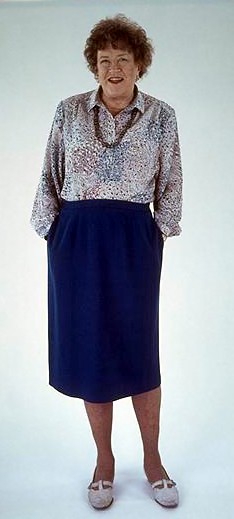Name dispute boils over: Julia Child foundation sues Williams-Sonoma
IN THIS ARTICLE
- Features Topic
- Stephen Nellis Author
By Stephen Nellis Friday, September 20th, 2013

A retouched Polaroid photo of the late cooking legend Julia Child taken by Elsa Dorfman in 1988 (Creative Commons photo)
The late Julia Child’s charitable foundation is suing cookware retailer Williams-Sonoma over allegedly misappropriating the cooking legend’s name to drive traffic to its stores.
Child, whose television shows and books inspired millions to try their hand at crafting French cuisine at home, founded the Montecito-based Julia Child Foundation for Gastronomy and the Culinary Arts in 1995. Its primary mission was to make grants for culinary scholarships.
When Child passed away in 2004, she left no heirs and put the foundation in charge of granting the right to user her name and likeness. Though the Santa Barbara resident was in many ways the dean of American gastronomy, she famously never endorsed any products, a policy her foundation continues.
In a lawsuit filed Sept. 4 in Santa Barbara Superior Court, the foundation alleges that San Francisco-based Williams-Sonoma violated that policy by using Child’s name in an August 2012 marketing campaign that spanned the company’s blog and social media efforts.
Williams-Sonoma did not return requests for comment for this story.
Williams-Sonoma has removed the marketing campaign from its website, but the Business Times obtained the original blog post using the Wayback Machine, an Internet archive.
The blog post occurred on what would have been Child’s 100th birthday on Aug. 15, 2012. It offered to give away, for free, copies of Child’s entire library of books to one winner who submitted their favorite Child recipe in the comments section.
The post took the form of personal reminiscences of Williams-Sonoma founder Chuck Williams about his relationship with Child and what he described as parallels between the rise of her popularity and his own company’s success. “‘I didn’t even need to watch her show to know what she’d cooked on any given night. … Because the next morning, countless customers would come into the shop asking for the exact size of sauté pan or soufflé dish that Julia had used,” Williams told the post’s author.
But the post also contained lines that, even if strictly factual, seemed formulated to bank on Child’s fame to drive traffic to the company’s locations. “The legendary chef was a frequent visitor to Williams-Sonoma stores,” the post reads.
Todd Schulkin, the foundation’s executive director, said the nonprofit felt that was a violation of its policies surrounding the use of Child’s name for commercial purposes.
“What’s surprising to the foundation is that this is such a widely known thing. It’s not a secret. Every biography written about her mentions it. And it’s clearly stated on our website,” Schulkin said. “Nevertheless, we’re once again in a position of having to take action to remind people that this is indeed the foundation’s continued position after Julia’s death.”
Other lawsuits
Indeed, this is not the first lawsuit the foundation has filed suit. The foundation took action against Thermador, the kitchen appliance brand, after it ran a series of ads with photographs of Child in her famous kitchen with Thermador products. While the pictures were factually accurate — Child had indeed used the products in her kitchen — the foundation argued that the company had not gained permission to use Child’s name and likeness in the ads. The foundation settled the legal action with Thermador, but is still pursuing action against the company’s advertising agency, Schulkin said.
Schulkin said the foundation’s primary mission is grant making, culinary research and providing some support to the Smithsonian Institute, where Child’s famous kitchen is housed for posterity. While the foundation does not make exceptions to its rules for granting name permissions, Schulkin said it often takes a gentler hand with small businesses or nonprofits, sending letters or making informal requests to cease using Child’s name before resorting to legal action.
He said that was not the case with Williams-Sonoma. “Our assumption is that a company that is large and established and publicly traded like Williams-Sonoma has people who are aware of the rules,” Schulkin said.
Schulkin also said that creative works — such as the film “Julie & Julia” with Meryl Streep — fall under a different area of the law from commercial works.
“In terms of this kind of marketing and the movie, they’re different animals. One is a commercial practice. The other pretty much falls under fair use — i.e., interpretive creative activity. Under the law those are treated differently, and correspondingly the foundation looks at them differently,” Schulkin said.
While Child never endorsed products, she did lend the use of her name somewhat regularly for the promotion of culinary arts and education. For example, Santa Barbara Culinary Arts, a nonprofit group, awards scholarships “in honor of Julia Child” to students at the Santa Barbara City College culinary arts program each year.
Schulkin said any money from legal proceedings would go back into the charitable trust’s scholarship funding activities.
“There are no beneficiaries and there are no heirs,” Schulkin said. “Any settlement damages or trial damages that may be received are pumped back into the nonprofit and its grant-making.”











